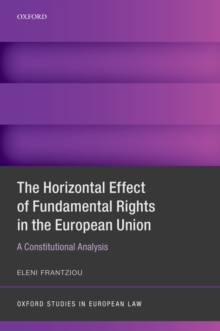
Accountability in the Economic and Monetary Union : Foundations, Policy, and Governance Hardback
by Menelaos (Assistant Professor, Assistant Professor, University Rotterdam) Markakis
Part of the Oxford Studies in European Law series
Hardback
Description
Following the financial and public debt crisis, the EU's Economic and Monetary Union (EMU) has been under intense political scrutiny.
The measures adopted in response to the crisis have granted additional powers to the EU (and national) authorities, the exercise of which can have massive implications for the economies of the Member States, financial institutions and, of course, citizens.
The following questions arise: how can we hold accountable those institutions that are exercising power at the national and EU level?
What is the appropriate level, type and degree of accountability and transparency that should be involved in the development of the EU's governance structures in the areas of fiscal and economic governance and the Banking Union?
What is the role of parliaments and courts in holding those institutions accountable for the exercise of their duties?
Is the revised EMU framework democratically legitimate?
How can we bridge the gap between the citizens - and the institutions that represent them - and those institutions that are making these important decisions in the field of economic and monetary policy?
This book principally examines the mechanisms for political and legal accountability in the EMU and the Banking Union.
It examines the implications that the reforms of EU economic governance have had for the locus and strength of executive power in the Union, as well as the role of parliaments (and other political fora) and courts in holding the institutions acting in this area accountable for the exercise of their tasks.
It further sets out several proposals regarding transparency, accountability, and legitimacy in the EMU.
Information
-
Available to Order - This title is available to order, with delivery expected within 2 weeks
- Format:Hardback
- Pages:416 pages
- Publisher:Oxford University Press
- Publication Date:02/04/2020
- Category:
- ISBN:9780198845263
Information
-
Available to Order - This title is available to order, with delivery expected within 2 weeks
- Format:Hardback
- Pages:416 pages
- Publisher:Oxford University Press
- Publication Date:02/04/2020
- Category:
- ISBN:9780198845263










